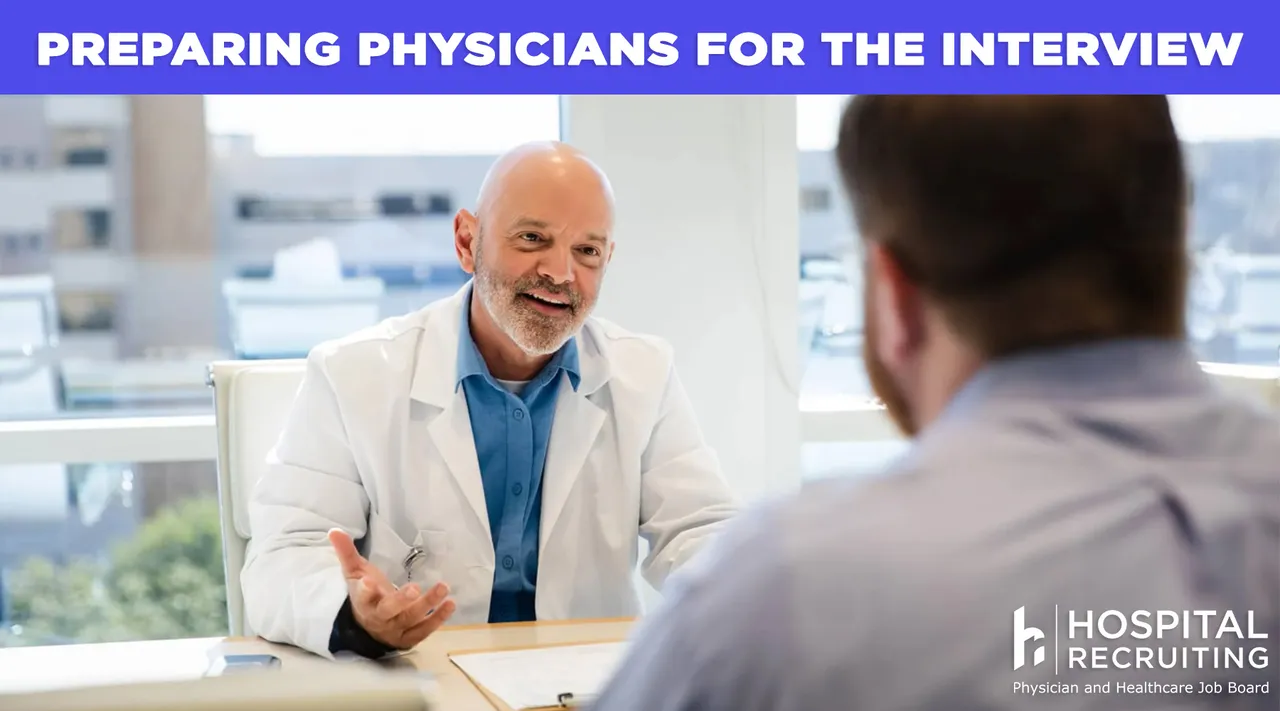How Recruiters Can Help Prepare Physicians for Interviewing

Preparing physicians for the interview process ensures they can confidently showcase their expertise and align with the organization's culture, mission, and values. Having done a little bit of homework ahead of time can create an empowering experience to stand out in a competitive field. Being prepared not only helps candidates present themselves in the best light, but allows them to clearly understand the role, team dynamics, and expectations of the position.
Preparation Strategies for Success
The interview process is an approach to assess both clinical competence and a cultural fit within an organization. Typically, it includes multiple stages like initial screenings, multiple in-depth interviews, and occasionally onsite visits where candidates can interact with potential colleagues and tour the facilities. These interviews may involve meetings with a medical director, leadership, department head, or peer clinicians, and sometimes a mix of all the above. The process is aimed at ensuring the candidate is both professionally qualified and suited to thrive in the organization’s environment.
In a post-COVID world, interviews are often conducted via Zoom, phone, or other online platforms. However, it’s still conceivable for candidates to visit the site in person to meet the team and tour the facility. This allows both the candidate and potential colleagues to evaluate how well they might fit within the team and environment.
Setting expectations ahead of time provides candidates with a clear understanding of what to anticipate throughout the interview process. An example of this includes:
- Who they will meet with (name and title)
- Number of interviews to expect (if more than one is needed)
- Any specific topics or questions that are related to the role
- Timeframe for a decision
By clarifying these details upfront, candidates can prepare effectively, feel more confident, and focus on presenting their skills and qualifications. Additionally, setting expectations helps to create a smooth and transparent experience for both the candidate and the organization.
Some additional things for them to keep in mind:
- Timeline for hospital privileges and payor credentials. Ask the medical staff office directly for these details.
- Does the candidate have a license in the state, if not how long will that take?
- Do they have a controlled substance permit if needed, and a DEA?
- Are they Board Certified or Board Eligible, and will any extra certifications be required prior to starting.
- Is training needed for use of the EHR
Types of Interview Questions

There are typically going to be three main categories that the interview questions will fall under. Behavioral, situational and competency. Simply making your candidates aware of the types of interview questions they may be asked can help them be much better prepared during their interviews.
Behavioral interview questions are designed to assess how they’ve handled situations in the past.
- Ethical Decision-Making: Professional standards and integrity.
- Patient Care Scenarios: Challenging cases, diagnosis, or a high stress situation.
- Adaptability and Problem-Solving: Flexibility and decision-making skills in uncertain situations.
- Time Management and Prioritization: Balancing multiple responsibilities, prioritizing cases or how they would handle a high patient load.
- Communication and Empathy: Ability to communicate effectively and empathetically with patients and families.
- Teamwork and Collaboration: How well they can work within a team of other professionals
Situational interview questions provide insight into their critical thinking, adaptability, and interpersonal skills.
- Clinical Scenarios: Hypothetical patient cases
- Handling Difficult Patients: Managing challenging patient behaviors or conflicts
- Emergency Response: Capability to respond to urgent medical situations.
- Ethical Dilemmas: Navigating ethical challenges in patient care.
- Adapting to change: Ability to adjust to new protocols and technologies
Competency interview questions assess their specific skills and knowledge needed to perform well.
- Clinical Skills and Knowledge: Medical expertise and technical abilities.
- Diagnostic and Analytical Thinking: Analyze information, recognize patterns, and make informed clinical decisions.
- Patient-Centered Care: Involving patients in their care and addressing their individual needs.
- Continuous Learning and Professional Development: Commitment to ongoing education and improvement in their practice.
What to Research Before a Physician Interview
Let them know that as the interviewee, a great place to begin is the hospital’s website. Advise them to collect information and familiarize themselves with the facility’s mission and goals, network with colleagues to gain insight, and explore their online presence. This can include social media, community involvement, and awards. These channels provide clues about their commitment to the community and patient-centered care.
When preparing your candidate to interview, it would be valuable for them to understand a few key areas.
- Patient volumes, demographic breakdowns, and payer mix (Medicare, Medicaid, or Private Insurance)
- Financials and revenue growth, debt levels, and budget allocations for the department they are applying for.
- Turnover rates for physicians and support staff.
- Patient satisfaction rates
These aspects allow them to ask meaningful questions and give a sense of whether this is an environment where they can see themselves thriving in the long run. A few questions I would recommend asking in the interview are:
- Patient loads, how it is distributed among the team, productivity targets, and time allocation for each patient.
- Team dynamic and structure, collaboration, support staff, and administrative support.
- Professionally growth opportunities, including certifications, CME courses, research, and if they support conference attendance for your specialty.
- Work life balance, flexibility with schedules, and how is coverage handled.
- Compensation, benefits, and if there is a non-compete clause.
These should give them a general overview of what to expect and encourage the candidate to ask more follow-up questions if needed.
Non-Clinical Skills That Make Them Stand Out
Beyond clinical skills, it's essential to let their personality shine and stay focused on the big picture. As a recruiter for Medical Oncology and Hematology, I've often seen situations where a candidate appears to be a perfect clinical fit, yet the onsite experience can tell a different story. While this isn’t always preventable, understanding the candidate’s motivations and goals helps the interview team assess how well the community and role align with the candidate’s vision for their future.
Prior to the interview I recommend candidates finding ways to highlight their leadership and teamwork experience and to be ready for related questions. Tell them to keep track of examples from their daily routine that showcase their approach to conflict resolution, mentoring, teaching, and quality improvement initiatives. Additionally, demonstrating their ability to communicate effectively and compassionately with patients is crucial. Focus on active listening, empathy, and compassion, and use specific examples to add context and depth to their experience. I would also suggest to the candidate that even though something seems insignificant to them, it might help the interviewer understand you on an interpersonal level.
The Right Way for Physicians to Follow Up
The final thing to touch on here is how to effectively follow up. The typical rule of thumb is to send a thank you email within 24 hours. The candidate can express their gratitude for the interviewer’s time and insight, and briefly restate their enthusiasm for the role and anything that stood out to them.
If the candidate hasn’t heard back after one week, they can send a friendly follow-up, and gently inquire about the hiring process timeline. A lot can happen behind the scenes and giving the hiring personnel time to connect with other decision-makers is critical.
Finally, participating in and conducting interviews requires a careful balance of assessing clinical skills and understanding candidates' interpersonal attributes. It’s vital to create an environment that encourages open communication. By focusing on both their professional qualifications and their interpersonal aptitude, you can ensure this leads to the selection of physicians who will not only excel in their roles but also contribute positively to the overall patient care experience.
Related Posts
